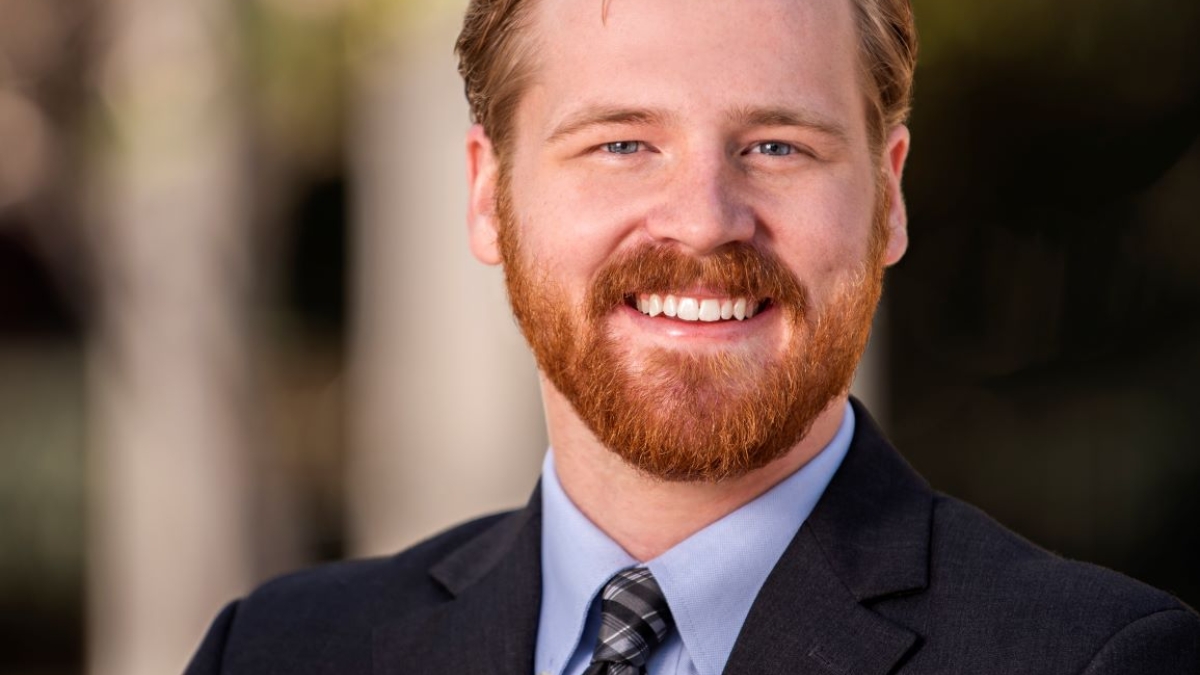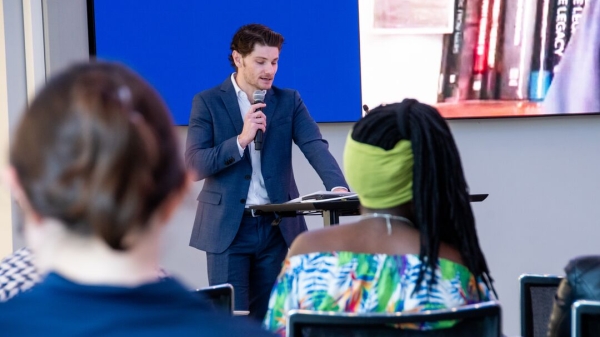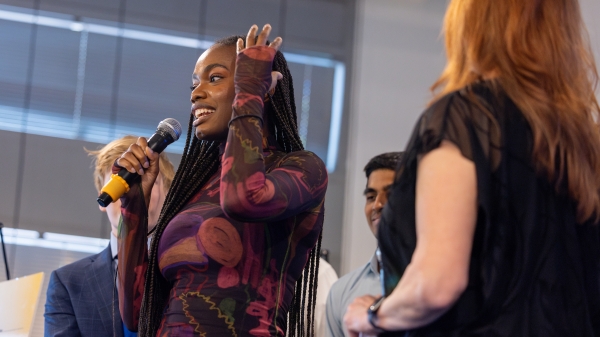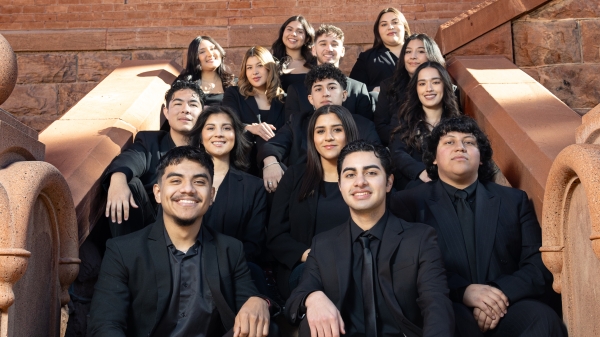Valley native Nathan Consalvo hopes to make a global impact

Nathan Consalvo
Editor's note: This story is part of a series of profiles of notable spring 2020 graduates.
Like many students, Nathan Consalvo, who this semester is earning his BS in business management, supply chain management, entered his freshman year at ASU unsure what he wanted to do.
After a formative experience seeing the horrors of human trafficking firsthand on a service trip to Cambodia, the Barrett, The Honors College student and W. P. Carey School of Business Turken Family Outstanding Undergraduate Student had his “aha” moment.
He explains, “I came back from this trip wanting to see the end of all forms of human trafficking, but I was not sure really where to start. Fast forward to my introductory supply chain management course where I learned how labor trafficking can be involved in an organization's third- or fourth-tier suppliers — without the company even realizing it. I felt then, as I do now, that business is in a unique position to combat a lot of the injustices we see in the world, and it seemed to me that supply chain was a primary avenue for combatting human trafficking.”
Nathan’s passion led him to excel across his entire ASU experience. He was vice president of the Barrett Residential Council, a consistent line on the Dean’s List, and the recipient of several scholarships, including the Department of Management Outstanding Student Scholarship, an Earl and Ellen Davis Scholarship and a Casey Self-Leadership Scholarship. He also completed a certificate in business data analytics.
We caught up with the Valley native to hear more about his experience as a Sun Devil.
Question: What’s something you learned while at ASU — in the classroom or otherwise — that surprised you or changed your perspective?
Answer: I kind of hit on this a little in my previous answer, but I was surprised to learn about the lack of supply chain visibility, meaning oftentimes a company really does not know much about what is going on with their third-, fourth-, or fifth-tier suppliers. It is no wonder labor trafficking is ripe within supply chains, and it makes me worry there is an even greater number of labor trafficking victims that we will never know about. It was this realization that helped solidify my perspective that both for-profit and nonprofit businesses have the ability to fix a lot of problems.
Q: Why did you choose ASU?
A: I chose ASU really because of the value. As I was getting ready to graduate high school, I looked at a variety of universities, including ones of varying sizes, degrees of exclusivity and locations. ASU really stood out to me in the way they provided a quality business program at an affordable cost. I could not justify spending incredible sums of money for some colleges when ASU was offering the same or (in many cases) better level of education. Coming from a small high school, I was also impressed with the resources available at a large university like ASU, such as research opportunities, study abroad trips and mentor networks.
I am incredibly happy I chose ASU and know it was the right choice for me. I have been impressed with the accessibility of the professors and how they really care for students.
Q: What professor had a major impact on your time here?
A: I can name a few professors who have had incredible impacts on my life, and I am so thankful for their investment. One that stands out in particular is Professor Kelvin Wong (economics). For Professor Wong's microeconomics class, I decided to do an honors contract in which I applied microeconomic principles that we learned to the "economy" of sex trafficking in Cambodia to better understand how it could be stopped. Professor Wong met with me time and time again to refine my ideas, brainstorm potential solutions, and go more in depth on the project. I am not sure if he knew much about human trafficking before our project together, but he always matched my enthusiasm and hope that change could be achieved. While I took Professor Wong's class during my sophomore year, we have both made it a point to keep in touch and regularly cross paths.
Another professor who stands out to me is Samantha Calvin. Even though I never took one of her classes, Professor Calvin helped me with a grant I was applying for to study successful anti-human trafficking campaigns. She reviewed so many proposal drafts, provided valuable insight, and connected me with a local anti-human trafficking organizations that I actually still keep in contact with. I was so impressed with her desire to go above and beyond to help an undergraduate student's independent research project.
Q: What’s the best piece of advice you’d give to those still in school?
A: I would say to find something they are passionate about and find a way to do as much as they can with it. Not only will this provide motivation to keep going when things get hard, but there are a lot of injustices in this world that need hope spoken into them. When people are able to combine the things that they are passionate about with an injustice in the world, it is powerful. I truly believe this can be the generation that sees the end of modern-day slavery, the end of world hunger, and more. But only if we all make intentional sacrifices to see it happen.
Q: What was your favorite spot on campus, whether for studying, meeting friends or just thinking about life?
A: My favorite spot on campus has to be the Secret Garden, although I am not sure it is a secret anymore. While it is not a great place for studying, the little piece of grass tucked away in the middle of campus always seemed to remind me of the things that really matter in life. I was — and really still am — amazed at how quiet the Secret Garden is, even in the middle of the day when everything seems so busy.
Q: What are your plans after graduation?
A: While COVID-19 definitely threw a wrench in some of my plans, I hope to continue to work for the company I am interning with right now, Tyler Technologies. Tyler is a company that focuses on providing software solutions to the public sector. Their goals of helping people who help their communities really resonate with me, so I hope to continue to work for them in a project manager-type role. In addition, I plan to attend the Antioch Discipleship School part-time. This year-long program focuses on personal development and is a prerequisite to work for a few organizations that combat human trafficking. Eventually, I would love to use skills I learn at Tyler and at the Antioch Discipleship School to combat human trafficking by starting my own supply chain consulting firm and/or working for anti-human trafficking nonprofits like the International Justice Mission.
Q: If someone gave you $40 million to solve one problem on our planet, what would you tackle?
A: This is a hard question. Based on my previous answers, I guess it is no surprise I am going to have to say human trafficking, but I am afraid money will only go so far on this particular problem. While money can help with some of the supply side drivers of human trafficking, such as poverty and providing legitimate jobs to keep people out of trafficking, I really think that as long as there is demand for it, there will be human trafficking. Therefore, to tackle human trafficking in a sustainable way, we have to combat it from a demand side simultaneously. I think the demand side is probably harder to tackle because we have to convince people to change their beliefs and behaviors. There was a "Real Men Don't Buy Girls" campaign a few years ago that took aim at the demand side of sex trafficking in the United States specifically, which was a wonderful example.
So, I guess I would use the majority of the $40 million to help combat the supply side of human trafficking by creating systemic changes that reduce poverty and increase jobs. Then, I would use the remaining money to help eliminate the demand through awareness campaigns, training companies how to actively combat human trafficking, and other demand facing solutions.
More Business and entrepreneurship

California roots, global impact: Thunderbird at ASU grad's journey in global management
Editor's note: This story is part of a series of profiles of notable spring 2024 graduates. Lake Forest, California, native…

ASU student entrepreneurs win cash investments for ventures at Demo Day
Several Arizona State University student entrepreneurs who won big cash investments for their ventures on Saturday expressed…

Hispanic Business Students Association marks half a century of impact, growth
When Michelle Macias, a native of Yuma, Arizona, became a business entrepreneurship and management student at Arizona State…